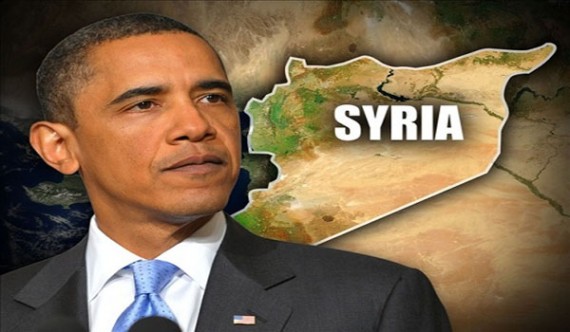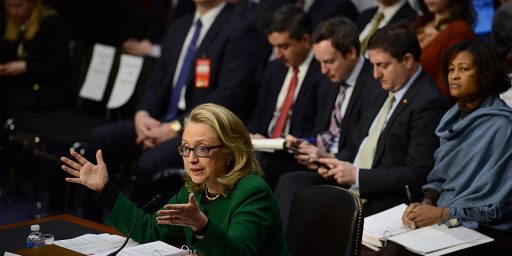Has Obama Just Undermined His Own Case For Attacking Syria?
The President has admitted that there is no imminent threat to the United States in Syria.
President Obama held a press conference at the conclusion of the G-20 Summit in St. Petersburg today, and his response to one question stood out to me:
I did not put this before Congress, you know, just as a political ploy or as symbolism. I put it before Congress because I could not honestly claim that the threat posed by Assad’s use of chemical weapons on innocent civilians and women and children posed an imminent, direct threat to the United States. In that situation, obviously, I don’t worry about Congress; we do what we have to do to keep the American people safe.
I could not say that it was immediately directly going to have an impact on our allies. Again, in those situations, I would act right away. This wasn’t even a situation like Libya, where, you know, you’ve got troops rolling towards Benghazi and you have a concern about time, in terms of saving somebody right away.
So, then, Mr. President, I have but one question.
If there is no imminent threat to the United States or its allies, and no imminent threat of a humanitarian disaster such as the one you cited in the case of Libya, then why are we talking about attacking Syria at all?
That, in the end, is the question that underlies the Administration’s entire case for action. So far, they have not provided a compelling answer.






President admits obvious, developing…
Obama’s statement parses as a rational and moral argument. There is no imminent threat against the United States, but we have the option of weighing in to reduce future use of chemical weapons upon civilian populations.
I never thought that there was a threat to the US, or that anybody had claimed that there was. The rationale was upholding international norms of sovereign state behaviors, and the problem is that if our attack has so strong an effect that Assad’s regime collapses, the next government could be a disaster. But threats to our nation or even to our immediate interest are not part of the calculus. It’s about living in a world where basic norms are adhered to.
Right, against this action as I am, this changes nothing. This was never about US national security.
The president is attempting to establish a new international framework for the use of military force around R2P.
Also, he is admitting that the U.S. would be violating the UN Charter, which requires Security Council approval or self-defense. In the past, America has bootstrapped onto UN resolutions that don’t specifically authorize the use of force, or expanded self-defense doctrines based upon imminent threats. The strength of American arguments has been questioned, but there has never been no argument at all. A strange journey Obama has taken from war protester, to Nobel Peace Prize recipient, to the architect of a brand new justification for military power.
I think we are talking about strategically taking out targets with some missiles as a tit-for-tat, not so much attacking Syria. I support Obama in doing that type of limited strike, provided we have international support – but, it seems we don’t have it. Obama has boxed himself in now, and I wish he had spoken on this subject entirely through surrogates.
If he doesn’t take action, it will appear as a tacit admission that Assad can order future chemical strikes. We won’t have the international support to intervene until the UN gets off its ass, and that will take awhile. If we had instead played coy with our intentions (and not blown off Putin over Snowden a few weeks ago), we might have been able to take a diplomatic approach to prevent future chemical attacks. That option is gone for good.
@Dave Schuler:
People look at me funny when get upset about R2P and the obvious pull that framework had within the Administration. This is the sort of think I was worried about.
@Erik G:
You haven’t been listening to the Secretary of State. He has been going on by the hour about “degrading Assad’s capabilities”. That’s no tit-for-tat.
Additionally, read the request for authority submitted by the White House or the version approved by the Senate Foreign Relations Committee. You don’t need unlimited time (the White House version) or sixty to ninety days (the Senate version) to do what you’re talking about. Clearly, they have more in mind.
@Dave Schuler: If you don’t want to call it tit-for-tat, call it whatever you want. I am supporting the degrading of Assad’s chemical warfare delivery capabilities as a punitive measure and a deterrent. I believe the explanation that the open ended request is to prevent the need to get Congressional approval each time this comes up, because it just gives more time for Assad to make adjustments while we publicly debate the options on the House floor. I don’t claim to know this, just think it. I would not call it accurate to say that they clearly have more in mind. We really don’t know for sure what they have in mind…which is, admittedly, sometimes enough to say “no”.
@Dave Schuler:
THIS! Again, any rational person should look at Obama and the people who surround him and see him as someone who believes in Intervention.
The only compliment I can offer is he’s being far more honest about the facts at hands than the NeoCons ever were about the Iraq invasion. That means we can have a far more honest debate about the underlying Interventionist policy of the current action.
What saddens me is that so many people who were quick to go after Neo-Con Interventionism are so quick to support Liberal Interventionism. And than many of these people were the first to attack the best case scenario thinking that gridded the Neo-Con promises for Iraq are themselves using base case scenario thinking to sell military strikes on Syria.
Someone cue Pogo.
@Erik G:
Again, what does this mean?
Seriously… It’s like victory in the war on terror…
Further, is there any way to actual achieve what you say you want to achieve *just* through the selective use of air strikes?
And if we were to do nothing, and no other chemical attacks occurred, then does that mean that the *serious* threat of strikes (even over a month after the fact) achieved the goal without any actual military action being taken?
To me, this was never about an imminent threat to the United States. Whether or not others want to base their decision on this issue on a perceived threat to America is another matter entirely.
I remain opposed to our intervention at this time.
@Matt Bernius: uh, it means that the US-of-A fires missiles into the suspected locations of Syrian missiles, and calls it a day. Much simpler to define than “victory in a war on terror”. Less missiles to use by Assad means less potential chemical weapon deliveries.
Regarding your other question: If we were to do nothing, and no other chemical attacks occurred, I don’t know if we can draw conclusions on what that means? I mean, unless Assad comes out and explains why, or it is gleaned through intelligence, we wouldn’t really know. It sounds appealing, nonetheless. I am honestly not sure where that question came from or is going…
@Erik G:
But that’s not what they’re proposing as multiple reports today have verified (NYT, others). They’re talking about a lengthy attack of several hundred targets.
@Matt Bernius:
I don’t think this is true. Regarding Democratic politicians, I don’t think any of the ones who opposed GWB’s interventions now support this one. As for the commenters at OTB, I don’t get the sense that people actually want to do this; it seems like a resignation that this is may be the least bad option. I disagree with that view, but I don’t get the sense that anyone is clamoring for this.
It’s also worthwhile to consider that an automatic opposition to any intervention is also very bad policy. I don’t know if that’s what your arguing for, but your comment suggests that “intervention” is, by itself, always bad.
@Dave Schuler: I wasn’t addressing the question of what the actual plan is. I was just addressing the question related to what I support doing.
Matt was questioning my statement: “I am supporting the degrading of Assad’s chemical warfare delivery capabilities as a punitive measure and a deterrent.”
Being neither a warmonger nor an anti-interventionist leaves me with no allies ;-/
What Eric G. said. Punishment designed to exact a tremendous price for using nerve gas would be my preference. I’m not comfortable with active violence but I’m less comfortable leaning that way than I am with passively assenting to greenlighting use of insecticides.
Fits with the theory he has already decided it’s highly likely Assad has been sufficiently deterred by the posturing, and unless he uses CW again, there will be no US strikes, doesn’t it?
@rudderpedals: For one thing, the evidence put forward that the Syrian government used chemcal weapons is tenuous at best. For another, the argument we can degrade Syria’s ability to use such weapons is an assumption; the historical record tells us air power is never as effective as its proponents would have us believe. There is also an implicit assumption that aggressive action will not result in significant consequences for the United States, an assumption I find less than believable given the devastating effects of the last twelve years of war both on American standing in the world and our society.
@Ben Wolf:
The evidence for the use of chemical weapons having been executed by the rebels is actually somewhat stronger than the case being made by the Obama Administration, at least the public case. The strongest public case that the regime was responsible for the attack, the case made by the French, nonetheless resorts to handwaving in assigning responsibility.
The United States has gone to war many times in situations where there was no imminent threat to the United States. Indeed, most of he times where the US goes to war, there is no imminent threat. So this is nothing new.
In 1990, Congress voted for the US to go to war against Iraq when Iraq posed no imminent threat. Does Dr. Joyner, who led US forces in that war, think that was an illegitimate war? Inquiring minds want to know.
Did Mr. Mataconis or Mr. Shuler oppose that war?
Although this is now thought to be one of the USA’s “good wars” , public opinion was sharply split at the time, with many objecting to the war because Iraq did not pose an “imminent threat” to the USA, because Kuwait was a medieval, bloodsucking Arab tyranny , and because we should not be fighting “for oil.” So the antiwar case wasn’t all that different.
The Bush Administration’s rationale was the abstract principle of defending the territorial sovereignty of the nation of Kuwait, or some such. It was less convincing than Obama’s rationale, TBH.
The Senate bill passed 52 to 47. Obama is on track to do better than that in the Senate, although he will do worse in the House. The Gulf War vote was 250-183 in the House.
Bottom line, this run up to intervention here is not that much different than the Gulf War, Bosnia, Kosovo, or Iraq. In all of those cases, the public was closely divided or against intervention, Congress was split, there was no imminent threat to the USA, and the Administration argued for intervention on a matter of principle. Interestingly enough, the Administration made its case each time.
@stonetools:
I can’t answer for Doug but I can for me. I’ve opposed every use of force by the United States over the period of the last 30 years. That includes the first Gulf War.
@Ben Wolf: You list reasonable concerns that I share. For me this poison thing trumps all.
@Dave Schuler: Thanks for that link. I was unaware of claims that rebel faction members had in fact been captured in possession of chemical weapons.
@ElizaJane: If it is about holding up international norms, how about WE hold them up before bombing others for not doing so….you know, norms like honoring the borders of sovereign nations, particularly allies. Or that norm that defines random drone attacks as terrorism by another, gussied up name. How about that norm of not attacking other nations (Libya for example) without a declaration of war or UN approval.
That is, if we really are concerned about noms…
@Laurence Bachmann:
Some of the norms are more normative than others.
Normally, that is.
@Dave Schuler: I hope this is sarcasm…so hard to tell these days.
@Laurence Bachmann:
And we still haven’t done anything on that entire “no torture” norm thing from that little thing over a decade ago.
Perhaps at some point the Saudi and Jordanian governments should launch some symbolic strikes on us to ensure we don’t torture again.
Read today Obama ordered the Pentagon to prepare an even more extensive target list, which undermines his “position” also. Still, the talking heads on the TV think he is desperate to “win” this…